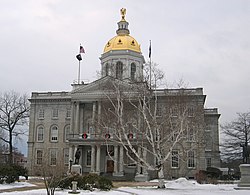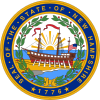Concord, New Hampshire
Concord, New Hampshire | |
|---|---|
 New Hampshire State Capitol | |
 Location in Merrimack County, New Hampshire | |
| Coordinates: 43°12′24″N 71°32′17″W / 43.20667°N 71.53806°W | |
| Country | United States |
| State | New Hampshire |
| County | Merrimack |
| Region | New England |
| Settled | 1659[1] |
| Incorporated | 1733[1] |
| Government | |
| • Type | Mayor–council |
| Area | |
| • Total | 67.19 sq mi (174.02 km2) |
| • Land | 63.96 sq mi (165.66 km2) |
| • Water | 3.23 sq mi (8.36 km2) |
| Elevation | 272 ft (83 m) |
| Population | |
| • Total | 43,976 |
| • Density | 687.52/sq mi (265.46/km2) |
| • Statistical area | 153,808[4] |
| Time zone | UTC−5 (Eastern) |
| • Summer (DST) | UTC−4 (Eastern) |
| ZIP Codes | 03301, 03302, 03303, 03305 |
| Area code | 603 |
| FIPS code | 33-14200 |
| GNIS feature ID | 873303 |
| Website | www |
Concord is the capital city of the U.S. state of New Hampshire. The land which Concord now occupies along the banks of the Merrimack River was settled thousands of years ago by Native Americans. The broad sweeps of the river valley, good soil for farming, and easy transportation on the Merrimack made the site of Concord equally inviting to English-speaking settlers in the eighteenth century. Settled by immigrants from Massachusetts in 1725, the community grew in prominence during the eighteenth century. Some of Concord's earliest houses remain today at the north end of Main Street. In the years following the American Revolution, the city's central location made it a logical choice for the state capital, and in 1808 Concord was named the official seat of state government. Today the 1819 State House is the oldest state capitol in which the legislative branches meet in their original chambers.
History
[change | change source]This area's first settlement in 1659 was named Penacook, for the Indian name Pannukog, meaning crooked place or bend in the river. The first land grant was in 1725, and the town was incorporated as Rumford in 1733. The name was changed to Concord in 1765 upon resolution of a bitter boundary dispute between Rumford and Bow. Its central location was the logical choice for state capital, and Concord was so named in 1808. The State House, built in 1818 and first occupied in 1819, is the oldest in continuous use in the country. In 1853, the State granted Concord a city charter. It was in Concord that the Abbotts built the famous Concord Coach, modeled after the coronation coach for King George III. Granite quarrying has been another major industry, and Concord's quarries supplied granite for the US Library of Congress. Concord was home to Franklin Pierce, 14th President of the United States, following his presidency.
Population Trends
[change | change source]Concord had the tenth largest numeric change in population, totaling 12,777 over 50 years, from 27,988 in 1950 to 40,765 in 2000. The largest decennial percent change was a 22 percent increase between 1980 and 1990; all other decades increased by ten percent or less. At the 2020 census, Concord had 42,336 residents,[5] which ranked third among New Hampshire's incorporated cities and towns.
References
[change | change source]- ↑ 1.0 1.1 ""Concord, NH", NH Economic and Labor Market Information Bureau profile".
- ↑ "ArcGIS REST Services Directory". United States Census Bureau. Retrieved September 20, 2022.
- ↑ "Geographic Names Information System". edits.nationalmap.gov. Retrieved 2023-05-08.
- ↑ "U.S. Census Bureau QuickFacts Merrimack County, New Hampshire". U.S. Census Bureau. Retrieved May 26, 2022.
- ↑ 5.0 5.1 "Concord city, Merrimack County, New Hampshire: 2020 DEC Redistricting Data (PL 94-171)". U.S. Census Bureau. Retrieved December 10, 2021.





